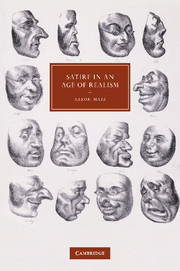Book contents
- Frontmatter
- Contents
- Preface
- Acknowledgments
- 1 Augustan satire and Victorian realism
- 2 Terminal satire and Jude the Obscure
- 3 George Gissing's ambivalent realism
- 4 The English critics and the Norwegian satirist
- 5 Truth and caricature in The Secret Agent
- Epilogue
- Notes
- Bibliography
- Index
- CAMBRIDGE STUDIES IN NINETEENTH-CENTURY LITERATURE AND CULTURE
4 - The English critics and the Norwegian satirist
Published online by Cambridge University Press: 04 April 2011
- Frontmatter
- Contents
- Preface
- Acknowledgments
- 1 Augustan satire and Victorian realism
- 2 Terminal satire and Jude the Obscure
- 3 George Gissing's ambivalent realism
- 4 The English critics and the Norwegian satirist
- 5 Truth and caricature in The Secret Agent
- Epilogue
- Notes
- Bibliography
- Index
- CAMBRIDGE STUDIES IN NINETEENTH-CENTURY LITERATURE AND CULTURE
Summary
THE MOST FAMOUS MAN IN THE ENGLISH LITERARY WORLD
Realism, for English critics of the last two decades of the nineteenth century, was the essential subject in dispute: they wanted to define what it was, and they wanted to determine what it was good for. Did the new literature come closer than earlier forms to representing everyday life credibly? Did “realism” signify a kind of representation that did not flinch before the squalid or the sordid? Were these books actually operating on the premise of authorial neutrality and objectivity (and was this even something writers should aspire to)? Or was it all a sham, a subterfuge to conceal a prurient imagination craving to drag a polite readership through the mud?
These questions revolved mostly around fiction and native English novelists: Hardy and Gissing are the two finest examples. But a comprehensive study of English criticism from the later years of the nineteenth century, when the realism disputes raged most violently, makes clear that the central case was neither a novelist nor an English writer. It was Henrik Ibsen, whose plays, along with their English reception, shaped the literary culture of fin-de-siècle England as decisively as the work of any other writer. The critics debating realism sparred over Ibsen's theater more contentiously than over the novels of Hardy or Gissing, of Balzac or Flaubert or even the notorious Zola.
- Type
- Chapter
- Information
- Satire in an Age of Realism , pp. 105 - 141Publisher: Cambridge University PressPrint publication year: 2010



